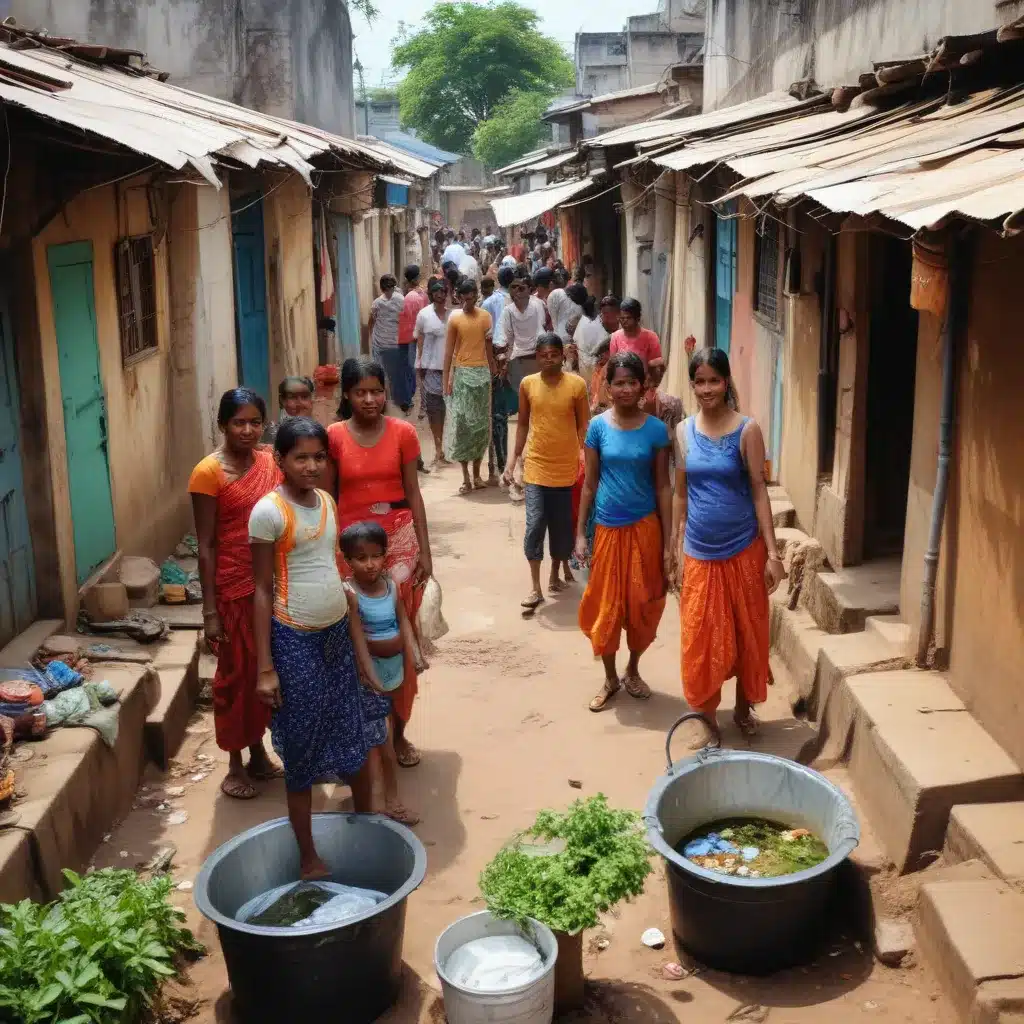
Empowering Hyderabad’s Underserved Communities through Innovative Sanitation Strategies
In the bustling metropolis of Hyderabad, India, a silent crisis has been unfolding for decades – the lack of adequate and sustainable sanitation solutions for the city’s vast slum populations. Faced with limited access to clean water, proper waste management, and functional toilet facilities, the residents of these marginalized communities have endured significant health and environmental challenges. However, a growing movement of community-driven initiatives is paving the way for a more inclusive and circular approach to sanitation, one that not only addresses the immediate needs but also fosters long-term resilience and environmental sustainability.
Leveraging Community Engagement for Sustainable Change
The key to unlocking lasting solutions lies in the empowerment of the slum communities themselves. By fostering strong partnerships between local authorities, non-governmental organizations (NGOs), and the residents, innovative sanitation initiatives have taken root, driven by the voices and aspirations of those most affected by the crisis.
One such initiative, spearheaded by the Joint Action for Water coalition, has been working tirelessly to promote community-based circular economy approaches to sanitation in Hyderabad’s slums. Through a multi-pronged strategy that combines infrastructure development, capacity building, and advocacy, the organization has been able to achieve remarkable results in improving access to safe and sustainable sanitation services.
Harnessing the Power of Circular Economy
At the heart of this approach is the principle of the circular economy, where waste is reused and repurposed as a valuable resource. By adopting this model, the community-driven sanitation initiatives in Hyderabad’s slums have been able to tackle multiple challenges simultaneously, from the lack of adequate infrastructure to the environmental degradation caused by improper waste disposal.
One innovative example is the installation of community-managed bio-digester toilet facilities, which not only provide a clean and reliable source of sanitation but also generate biogas as a byproduct. This biogas is then used for cooking and heating, reducing the reliance on traditional fuels and creating a self-sustaining cycle of resource utilization.
Furthermore, the initiative has focused on empowering local entrepreneurs to establish small-scale waste collection and recycling enterprises within the slum communities. By providing training, technical support, and access to markets, these community-based businesses have been able to transform the once-discarded waste into valuable products, such as compost, recycled building materials, and even biofuel.
Fostering Inclusive Governance and Policy Change
Recognizing that sustainable sanitation solutions require a holistic approach, the Joint Action for Water coalition has also been actively engaged in advocating for policy changes and inclusive governance models at the local and regional levels.
Through collaborative workshops and dialogues with municipal authorities, the organization has been able to influence the development of new sanitation policies that prioritize the needs of slum dwellers. These policies have paved the way for increased funding allocations, streamlined permitting processes, and the integration of community-based organizations into the decision-making frameworks.
Moreover, the coalition has worked tirelessly to ensure that the voices of slum residents are heard and their perspectives are incorporated into the planning and implementation of sanitation infrastructure projects. By empowering community leaders and fostering inclusive governance structures, the initiative has been able to create a sense of ownership and accountability, ultimately leading to more sustainable and equitable outcomes.
Tackling Health and Environmental Challenges
The impact of these community-driven sanitation initiatives extends far beyond the immediate improvements in access to safe and reliable toilet facilities. By addressing the root causes of the sanitation crisis, the interventions have also had a profound impact on the overall health and environmental well-being of the slum communities.
The installation of bio-digester toilets, for instance, has not only provided a safe and hygienic means of waste disposal but has also helped to reduce the spread of waterborne diseases, such as cholera and dysentery, which have long plagued these marginalized communities. Furthermore, the integration of waste-to-resource initiatives has led to a significant reduction in the amount of untreated waste being dumped into nearby water bodies, mitigating the risk of water pollution and the resulting environmental degradation.
Building Resilient and Sustainable Communities
As the world continues to grapple with the challenges of urbanization, climate change, and resource scarcity, the community-based circular economy approaches to sanitation in Hyderabad’s slums offer a promising model for other cities to emulate.
By empowering local stakeholders, fostering inclusive governance, and leveraging the principles of the circular economy, the Joint Action for Water coalition has demonstrated how innovative sanitation solutions can not only address immediate needs but also build long-term resilience and environmental sustainability within marginalized communities.
As the organization continues to expand its reach and inspire others to follow its lead, the hope is that the residents of Hyderabad’s slums will no longer be forced to endure the consequences of inadequate sanitation, but instead can thrive in healthy, prosperous, and environmentally-conscious communities.
Conclusion: Scaling Up for Systemic Change
The success of the community-based circular economy approaches to sanitation in Hyderabad’s slums has not gone unnoticed. Across the region and beyond, cities facing similar challenges are taking note and exploring ways to replicate and scale up these impactful initiatives.
By sharing best practices, fostering cross-regional knowledge exchange, and advocating for policy reforms at the national and international levels, the Joint Action for Water coalition is working to catalyze a broader movement for sustainable and inclusive sanitation solutions. Through these collaborative efforts, the organization hopes to empower more communities to take charge of their own destinies, transforming the way we think about water, waste, and the fundamental right to a healthy, dignified living environment.
As we move forward, the lessons learned from Hyderabad’s slums serve as a testament to the power of community-driven action and the transformative potential of circular economy approaches. By embracing this holistic and inclusive model, cities around the world can pave the way for a future where no one is left behind, and where sustainable sanitation solutions are the foundation for thriving, resilient communities.

